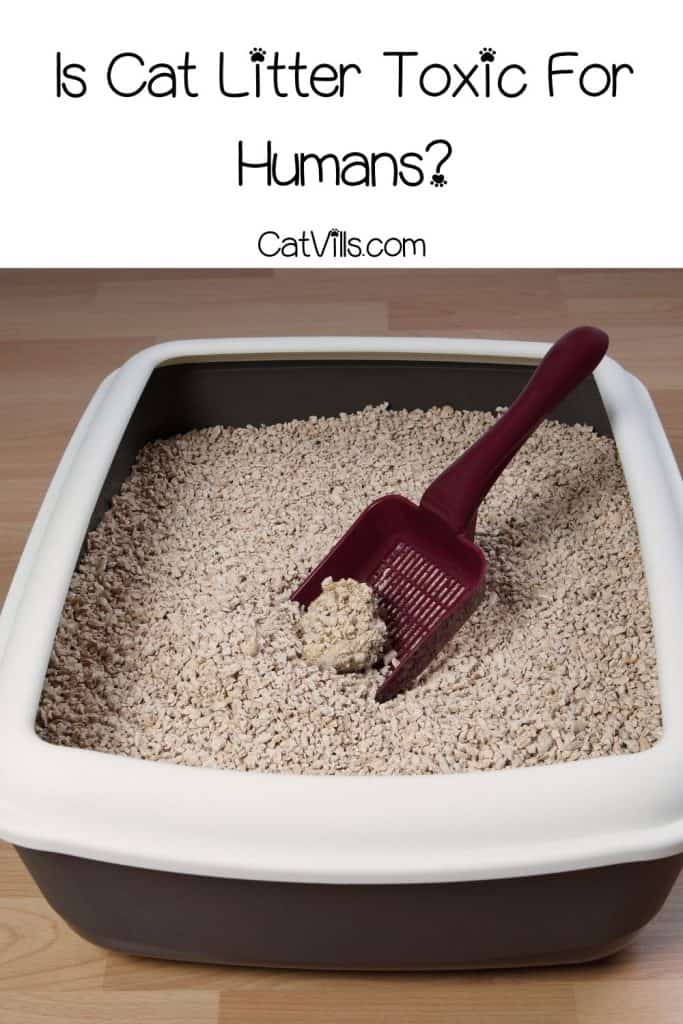Last Updated: 1 year ago
We love our cats. They’re cute, cuddly, and always there for us.
But what if cat litter is toxic to cat parents?
Instead of bringing joy and being the source of countless internet memes, they’re actually a source of serious danger.
Begging the question, is cat litter toxic to human beings?
Does Cat Litter Pose a Danger to Humans?
Cat litter can pose varying degrees of danger to humans. It depends on hygiene, cat health, and the type of litter you use.
Clean kitty litter poses less risk than dirty. First, I’ll look at clean litter and any negative impacts it has, and then I’ll look at dirty litter, and dust.
To start, there are parasites and other issues that cat litter can cause, making it toxic, while I’ll cover.
Read on to find out how the three forms of litter impact its safety for humans and to find out if “is cat litter toxic.”
Clean Cat Litter
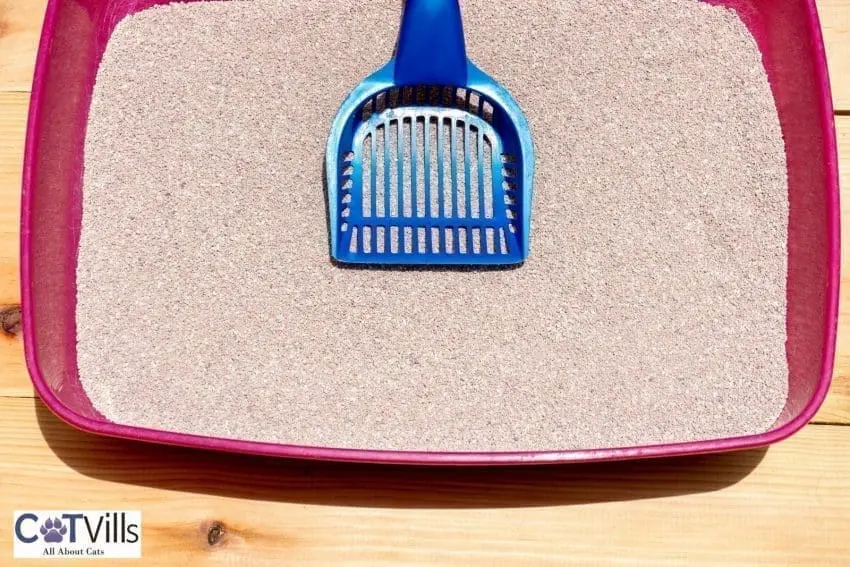
Clean cat litter is one without feces, urine, or dust. It’s not toxic to cat parents.
Most of the health concerns associated with cat litter result from keeping dirty kitty litter in your house.
It’s essential to keep your cat’s litter box clean to reduce the risk of exposure to harmful toxins and bacteria like E. coli and salmonella.
If you have a cat, it’s essential to clean their litter box regularly. Apart from keeping your house free of unpleasant odors, clean kitty litter encourages the cat to use the litter box and helps to keep them healthy.
To keep your kitty’s litter clean, scoop it daily and completely change the litter weekly.
Let’s take a look at the risks you are exposed to if you do not keep your cat litter box clean and its safety for humans.
Is Cat Litter Safe for Humans and Kids?
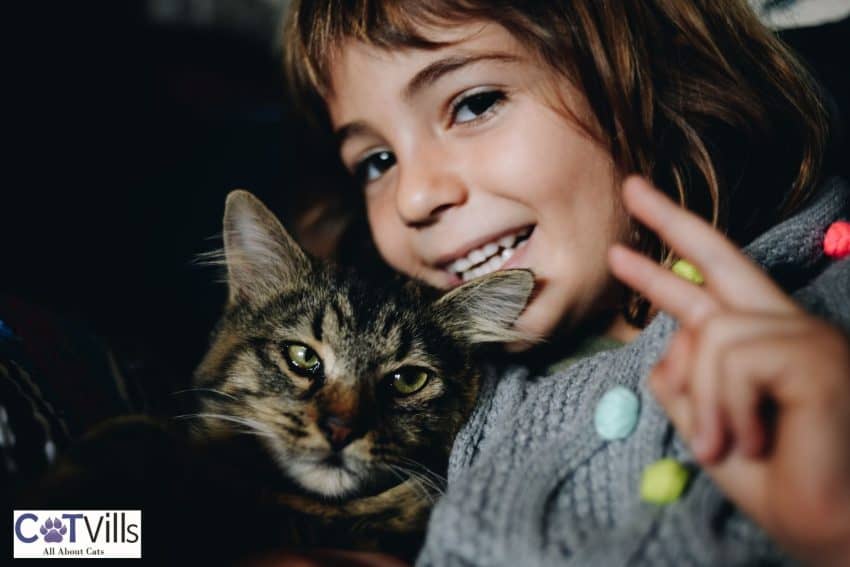
Yes, clean feline litter is safe for humans and kids. This litter is safe because:
- It does not have cat feces that may contain parasites like Toxoplasma Gondii (T. Gondii) that would otherwise cause sickness.
- It’s free of cat urine that contains ammonia. When exposed to ammonia, you may experience eye and skin inflammation as well as respiratory diseases like bronchitis.
I noticed that my kid inadvertently plays with contaminated litter and then inserts his fingers in his mouth. This is common with many kids.
As a cat owner, you must be careful with your kids in the presence of contaminated feline litter. Always ensure that the cat litter box is covered.
When it comes to health concerns, it’s always better to err on the side of caution. If you have any concerns about your health or your family’s health, consult a medical professional.
What about pregnant women? It is common knowledge that pregnant women are warned to avoid kitty litter. But why? Let’s take a closer look.
Is It Toxic for Pregnant Women?
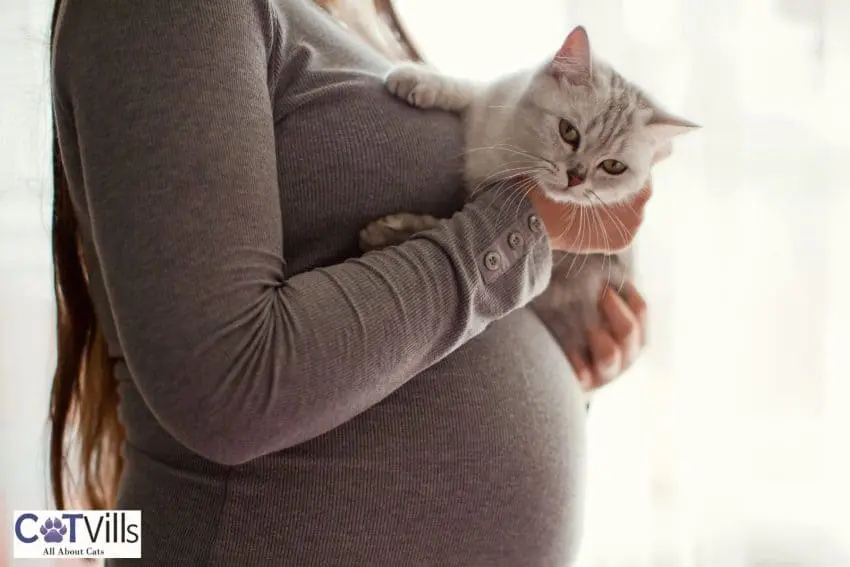
Clean kitty litter is not toxic for pregnant women. However, there is a risk of toxoplasmosis infection if the feline litter box is not clean.
T. Gondii) is responsible for toxoplasmosis. Cats can get this parasite when they eat raw meat from rodents.
If you’re pregnant, it’s advisable to have someone else clean the litter box. If you must clean it, be sure to wear gloves and a mask and wash your hands thoroughly afterward.
In addition to being a risk to pregnant women, litter has risks for every human.
What Disease Can You Get From Cat Litter?
- Escherichia Coli bacterial infection: Cat feces may contain E. coli that can cause an infection if ingested inadvertently. The disease causes severe diarrhea, stomach cramps, and vomiting.
- Toxoplasmosis: This is an infection caused by Toxoplasmosis Gondii, a parasite found in contaminated soil, sand, and kitty litter. The condition causes allergic reactions, flu-like symptoms, swollen lymph nodes, and muscle aches.
Babies may get toxoplasmosis if the mother has been infected just before or during the pregnancy, even if they don’t have signs of the disease.
What happens if you, a child, or a pet accidentally ingests litter, clean or dirty? Is it toxic?
Is Cat Litter Toxic to Ingest?
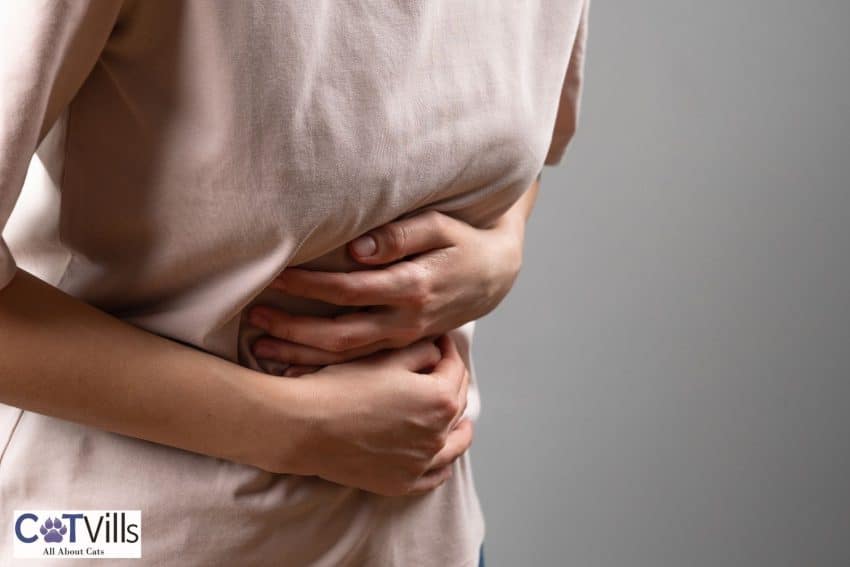
Unsoiled cat litter is minimally toxic. If ingested, it may cause an upset stomach or vomiting. However, eating clay-based feline litter can cause serious health problems like intestine blockages.
If your child swallows a mouthful of clean litter, there is no cause for alarm. Give them water or milk to drink and watch for signs of dehydration like vomiting and diarrhea.
Ingesting more than a mouthful of kitty litter can be detrimental. If this is the case, consult the Poison Center immediately.
However, dirty litter ingestion puts you are risk of one of the diseases mentioned above.
This brings me to another risk. Is litter poisonous or carcinogenic?
Is Cat Litter a Carcinogen?
It depends on the type of cat litter. Most clumping litters contain crystalline silica dust, a known carcinogen for household pets and humans when inhaled.
Crystalline silica is also one of the leading human lung carcinogens.
What about pets? Is there a risk to your other pets, like your rabbit or dog from kitty litter?
Is Cat Litter Safe for Other Pets?
You can safely use cat litter for some pets like dogs, but for other animals, you need to choose the material carefully.
Let’s take a closer look.
Can you use cat litter for other pets?
A simple answer is that it depends on the type of pet. Materials like sodium bentonite and clay that can be harmful to some pets are used to make feline litter.
Dogs can be trained to use any type of litter. however, other pets should only be exposed to traditional cat litter made from corn, wood, and wheat.
As with rabbits, only use organic and natural litter made from alfalfa, oat, paper, or citrus. This is because rabbits nibble on anything around them and might ingest the litter.
Ingesting bentonite clay litter dust can cause health problems in birds like liver and kidney damage. Wheat litter and other natural cat litters work well for birds.
Now that you have a good introduction to the risks, let’s take a deeper look at dirty litter.
Dirty Cat Litter
Dirty kitty litter contains cat waste, dust, and other contaminants harmful to humans.
I’m certain you’re wondering how often to change cat litter to keep it clean? Although there’s no direct answer to this as it depends on factors like the type of cat litter and the number of cats using it, do it every 2-4 weeks.
Changing your cat litter also protects you from the dangers of cat litter to humans like exposure to T. Gondii.
If you’re not sure how to clean your kitty’s litter box properly, watch the following video:
So what are the risks of dirty kitty litter? Read on to find out.
Are Cat Urines and Feces Dangerous to Humans?

Yes. Cat urine and feces are dangerous to humans.
Cat feces are the leading carriers of E.Coli and T. Gondii. These parasites cause infections that lead to severe diarrhea, stomach cramps, kidney disease, and vomiting when ingested.
E.Coli causes Escherichia Coli bacterial infection. This infection is associated with bouts of diarrhea and abdominal cramps.
T. Gondii causes toxoplasmosis, an infection passed from animals to humans. This disease causes severe flu-like symptoms, such as swollen lymph nodes and muscle aches.
If left to grow in a human’s body, T. Gondii leads to a myriad of health problems like:
- Brain inflammation
- Heart diseases
- Liver diseases
- Eye and ear infections
Cat urine contains high levels of highly focused ammonia. Ammonia gas is responsible for unpleasant odors in the house when the litter is dirty.
Inhaling ammonia fumes from cat urine can cause respiratory problems, headaches, watery eyes, and nausea.
Children and people with low body immunity or respiratory conditions like asthma, pneumonia, and bronchitis are at a higher risk of ammonia infection.
In case of contact with the urine, wash your hands with soap or a detergent immediately.
Baking soda is an excellent deodorizer if you want to eliminate ammonia odors. However, the question asked by most cat owners is, “Will baking soda hurt cats?”
When used in the right quantities, baking soda will not hurt your cat. That’s is you handle dirty litter but what if you breathe it in?
Can Breathing in Cat Poop Make You Sick?
Yes because T. Gondii can be transmitted through the air. When an infected cat defecates, the T. Gondii oocysts are released into the air and can be breathed in by humans.
If you breathe in cat feces that contain the parasite, you’ll risk getting toxoplasmosis. The disease also affects other household pets like dogs.
To learn more about the dangers of cat litter to humans take a look at this video.
Inhaling cat waste isn’t the only risk, dust also poses a risk to you, your cats, and other pets’ health.
Cat Litter Dust
Cat litter dust is formed when particles in the litter are broken down into a powder. This happens when the particles rub against each other during transportation.
There are various dangers of cat litter dust to humans. The main ones include toxicities from exposure to sodium bentonite and lung complications from inhaling crystalline silica dust.
Dust-free litters like Dr. Elsey’s Precious Cat Ultra Unscented Clumping Clay Cat Litter are recommended for use in the house to eliminate the above dangers.
What happens when you breathe in dusty litter?
Is Breathing Cat Litter Bad?
Yes, breathing cat litter is bad because when inhaled, crystalline silica dust from most clumping litters can cause silicosis.
This is a lung disease that can lead to shortness of breath, coughing, and even death.
In terms of breathing, clumping kitty litter is more toxic than non-clumping litter due to silica.
Inhaling crystalline silica dust can also cause cancer. The dust is classified as a human carcinogen.
Other side effects of inhaling dust from cat litter include:
- Coughing
- Sneezing
- Watery eyes
- Itchy throat
- Runny nose
With all this said, it is clear that in addition to good litter box hygiene, you need to know how to safely handle kitty litter.
How to Safely Handle Cat Litter
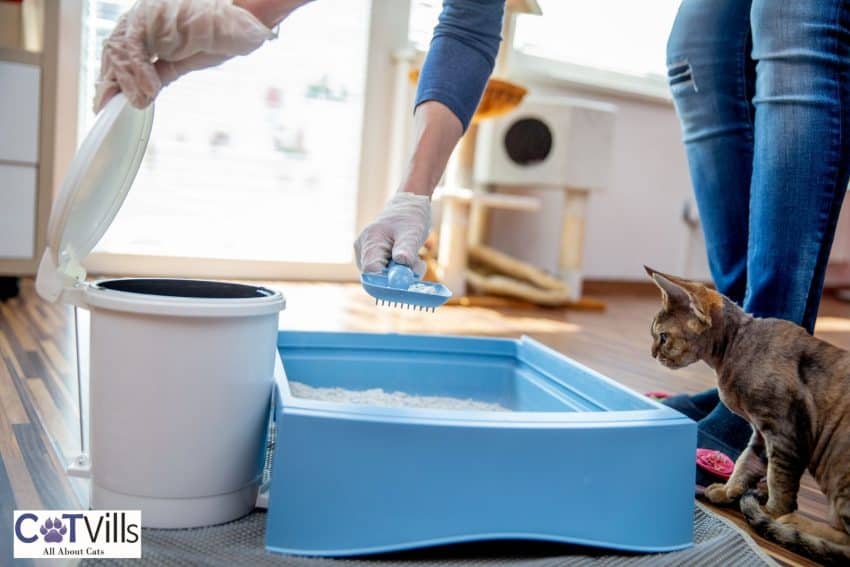
It’s essential to handle kitty litter safely by:
- Wearing gloves and a mask when handling feline litter
- Washing your hands with soap thoroughly after handling feline litter
- Keeping the litter away from children
- Changing the litter regularly and disposing of it properly
- Not flushing kitty litter down the toilet as it can clog pipes
- Not keeping a dirty litter box in your house
- Cleaning the litter clumping daily with soapy water
- Staying away from feline litter if you have a low immune system or are pregnant
FAQs
WHAT IS THE SAFEST CAT LITTER?
The safest cat litter is unscented and made of natural materials like wood, corn, or paper because they’re not biohazards. Sodium bentonite litters may cause lung coats in cats when inhaled.
IS IT OKAY TO HAVE A LITTER BOX IN MY ROOM?
Do not put a dirty litter box in your room unless it’s a large room where the sandbox will be far from your bed. This prevents you from inhaling toxic fumes from cat waste.
DO INDOOR CATS HAVE TOXOPLASMOSIS?
Indoor cats are not likely to be infected with toxoplasmosis. Toxoplasma in cats results mainly from hunting and eating raw meat. In most cases, indoor cats eat cooked meat.
Conclusion
While cat litter is not immediately toxic, it can cause harmful effects if not handled properly. Dirty kitty litter may cause infections like toxoplasmosis and respiratory illnesses from ammonia.
The best way to avoid any problems as a pet owner is to wear gloves and a mask when handling litter, wash your hands thoroughly afterward, and keep the cat litter box clean.
Now that you have answers to the question, “is cat litter toxic?” take the necessary precautions to keep you and your family safe.
What are your thoughts about cat litter being toxic for humans? Let us know down in the comments below!
